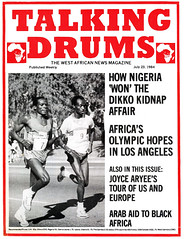ECOWAS and its first decade, 1975-1985: a review (part 3)
Kwadwo Pobbi-Asamani
Dr Kwadwo Pobbi-Asamani of University of Columbia concludes his review of the economic grouping. (see part 1 and part 2)The miserable state of the economies of the countries in the West African sub-region is enough to cause collective concern. It is abundantly clear that traditional or old models of economic co-operation and integration are not suitable for economic co-operation and integration in the development process of the Third World in general, and West Africa in particular.
The Heads of State and governments of West Africa should put their heads together and seriously consider a regionally functioning regime for economic co-operation and integration. In order to make ECOWAS more relevant, they should move from passing resolutions at annual meetings to the state of finding practical solutions to some of the pressing problems in the sub-region. The conceptual framework for economic co-operation and integration among such Third World (developing) regions as ECOWAS can be better understood within the framework of an all-involving developmental pro- gramme agreed upon by all the member-nations. This could also make them eventually tend toward more interdependence and self-reliance in solving their problems rather than a single interest, nation-by-nation or country-by-country approach.
The experiences of the last ten years have made it abundantly clear that the future success of ECOWAS must depend on the political commitment and dynamic leadership of the Heads of State and governments of West Africa towards a continued interest in the activities and objectives of the organisation. All the leaders and people have accepted or chosen the policy-objective of self-reliance, and also the goal of the improvement of the quality of life for all their people.
Ideally, the Heads of State and governments of West Africa should supp- ort interstate activities and initiate a rational approach to development, if the development process is to be beneficial to all their people. The process should emanate from the heart and mind of the people of West Africa. Indeed, the removal of Alhaji Shagari, the former president of Nigeria, and the sudden death of President Ahmed Sekou Toure of Guinea, two strong supporters of ECOWAS, places the future of the organisation in doubt indeed.
Finally, there should be a rational and scientific approach to the community and the environment. Man's place in society, the belief in change and the capacity to improve and transform one's environment, should be the basis for investment in science and technology. Special emphasis should be placed on the development of a science-oriented problems: system of education and training. Emphasis should be on quality, which must be the basis of true development within the community.
The organisation (ECOWAS) has a great deal to gain, if only the leaders of the member-states and the staff of the secretariat will take advantage of the experiences and lessons offered by other integration movements in the Third World.
In addition, flexibility and the optimum use of educational resources as standards in the learning process must be brought to bear on the situation. The advantages of close co-operation among States with comparable political and economic institutions in West Africa is obvious. For one, the nations in the sub-region could live better by working together and promoting regional self-reliance, in accordance with the Lagos Plan of Action.
As stated above, the establishment of ECOWAS on a broader scale as a regional organisation for development and planning offers opportunities for integrated sectorial planning or programming. However, fraught with political difficulties and because of its broader scope, ECOWAS has yet to move to this stage. CARICOM has been studying the possibility of initiating this scheme for a number of years. Sectorial programming and planning is an area where the rationalization of regional development could be combined with the economies of scale in the use of scarce resources in West Africa.
In this respect, member-states of ECOWAS should first break away from economic nationalism ог autarky and the laissez-faire approach of freeing trade. They should, rather, formulate and implement regional policies to restructure the existing econ- omic relationships among member countries and the rest of the world, in relation to the New International Economic Order (NIEO).
The organisation (ECOWAS) has a great deal to gain, if only the leaders of the member-states and the staff of the secretariat will take advantage of the experiences and lessons offered by other integration movements in the Third World. The Executive Secretariat should address itself to some of the following
1) By playing a leading role in the initiation of proposals, formulation of policies, implementation of measure and negotiating compromises among member-states. Needless to say, thi crucial role is underscored by the experiences of CACM, CARICOM and the Andean Group.
2) ECOWAS should go beyond the creation of a customs union, and place emphasis on the benefits of economic co-operation and integration, such a regional infrastructure, self-sufficiency in food, and structural transformation, whereby regional needs are reflected in regional production. 3) ECOWAS should recognise and respond to the less-advantaged coun- tries in the Sahel with specific guaran- tees of benefits for economic co-operation and integration.
4) The ECOWAS treaty should be revised to include such measures as increased local control of the economy, greater diversification of extra-regional trade, and increased economic and political autonomy from the traditional dominant metropolitan powers in the sub-region.
The ultimate success of ECOWAS tc achieve collective self-reliance will depend on the adoption of policies which will restructure the economies and policies of the sub-region by the regulation of foreign investment and the transfer of technology, as embod- ied in ANCOM's Decision 24, and CARICOM's co-ordination of foreign policy and proposed Draft Agreement of Technology.
